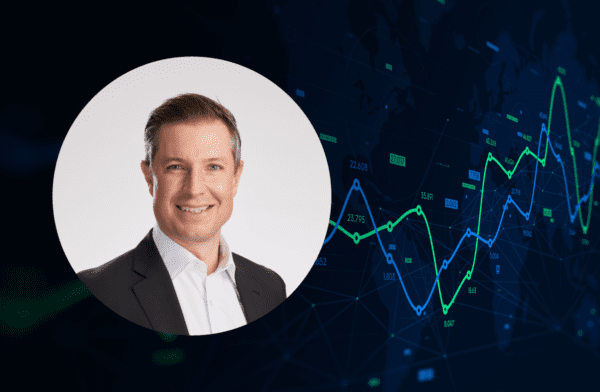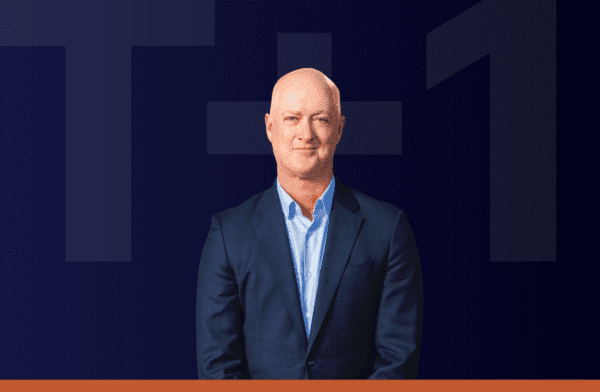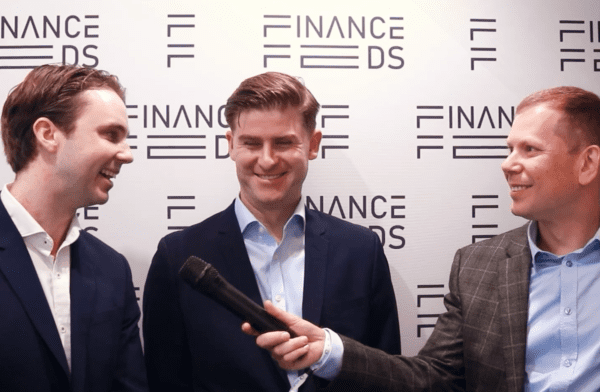



James Alexander speaks to e-Forex on the changing prime broker landscape
26 Degrees Global Markets’s Chief Commercial Officer James Alexander sits down with e-Forex’s Larry Levy for an insightful Q&A interview to discuss the changing prime broker landscape.
The pair discuss the challenges facing the FX Prime Brokerage landscape, including the recent announcements that certain names will either exit or scale back their engagement in the space. To watch the full interview, click here.
A transcript of the interview is below.
Larry Levy: Today, e-Forex chats with James Alexander, Chief Commercial Officer at 26 Degrees Global Markets. James, welcome and thank you for coming on the e-Forex podcast.
James Alexander: Thank you very much for having me. It’s a pleasure.
Larry Levy: James, before we get into the main bulk of the questions about FX Prime Brokerage (PB), can you tell us about 26 Degrees Global Markets? Who you are, where you’ve come from and the vision for the future.
James Alexander: Absolutely. Thanks Larry. 26 Degrees Global Markets is a non-bank provider of Prime Services based in Sydney, Australia. We’ve been in operation for nearly 10 years now. But our parent company, which is listed in Tokyo, has a lineage that dates back to the 1960’s.
We specialise in multi-asset Prime Services, but really have a focus on FX PB, along with other asset classes.
The goal for the future is for us to expand our footprint globally. Not just with offices in Tokyo, Sydney and Europe which we presently have, but expanding our footprint further and reaching an ever-diversified and more diversified audience predominately focused on hedge funds and inter-dealer brokers.
Larry Levy: Excellent. So you’re predominately in the B2B space rather than obviously the B2C space, right?
James Alexander: Correct. Yep, we’ve got a real focus on the institutional side of the business.
So, our customers generally include hedge funds, quantitative trading funds and other brokerages themselves; many of whom are inter-dealer brokers or retail-facing brokers.
So we definitely try to focus on the wholesale and the institutional channels.
Larry Levy: Excellent.
There has been some rapid change in the PB landscape with the recent announcements regarding certain names either exiting or scaling back their engagement in the Prime Brokerage space, especially in FX. Has that been a surprise to you?
James Alexander: Yes and no Larry. I think many in the industry have felt that, particularly with FX PB, these are businesses that do require significant scale and significant scale really comes from a broad and diversified customer base and a strong balance sheet and the ability to service that broad and diversified base.
For those in the industry who haven’t necessarily got that scale of the customer base or the other scale in their business models it really is quite a challenging time. Because those regulatory headwinds that increasingly are biting down on those Tier 1 PBs are adding additional costs, they’re curtailing client onboarding and really just adding red tape to business models.
So, while in that regard while some of the names that we have seen either exit or scale back have been a bit of a surprise. The broader trend is one that we here have been suspecting will play out for quite some time and really plays into our core strategic focus which is that a non-bank prime broker really is well positioned at the moment given the regulatory landscape and the evolving needs of clients to really grow and scale our business.
Larry Levy: Excellent. What does this mean more broadly for the PB industry on a global scale?
James Alexander: Well I think some of the exits we’ve seen will have a ripple effect more than others and I do think that those exits or scalebacks really continue to play into the existing themes that we’ve seen. Those continued tightening of risk conditions and rewriting commercial terms that really we’ve seen play out over the past 12 months and which I guess predominately started with the fallout from the Archegos Capital Management debacle.
That incident has really rippled through the PB industry and I think a number of the Tier 1 bank PBs in particular are really assessing the way they onboard, the way they offer credit and the questions and the due diligence they perform with their customers with respect to other facilities because one of the key things that was really scrutinised post the collapse of Archegos was the fact that any entity, whether they be a hedge fund, a quantitative trading fund or indeed an interdealer broker may have multiple facilities out to the street and its really been that component of credit allocation that has been most heavily scrutinised.
I think the other impact that is being observed and we certainly see this and hear this through the conversations we have with customers and indeed our own PBs is that the onboarding queue for new clients trying to access PB facilities has never been longer or slower.
I think the additional due diligence that’s being performed is slowing that process and whenever you have one or many PBs looking to exit or offboard clients it naturally causes a bit of a bottleneck at those PBs that do continue to onboard and have the appetite to do so.
So the onboarding queue has gotten a little longer, and it’s a little slower to move forward. I think ultimately that re-rating of risk and commercial conditions that we’ve seen is starting to have an impact and I think clients are really questioning whether they’re getting value from that PB engagement that they want or they expect. For me, the answer will be yes.
For others, particularly those small to medium-sized hedge funds into dealing brokers who may find themselves at the lower end of that PBs customer tier. That’s a very valid question, the whole “Am I getting value from this engagement right now?”
I think for us, strategically at 26 Degrees Global Markets that really plays into where we really want to step forward and expand that footprint as I mentioned.
Larry Levy: What are your thoughts on the idea of a broker having a prime or prime FX prime brokerage as a backup to their Tier-1 Prime Brokerage?
James Alexander: It’s funny you mention that Larry, because that’s the conversation we’re having time and time again at the moment.
Because we provide access to a number of different asset classes predominately FX and metals, as I mentioned, but also equities, equity derivatives and futures and futures derivatives as well on an OTC basis.
We would always take the approach within our own business that we’ll have multiple prime brokers that will sit on our panel for each of those asset classes so we’re never reliant on a single PB for any of the asset classes that we bring to market and look to offer our customer base.
So, the concept of having a Tier-1 PB sit alongside a prime of prime is actually a really interesting one. And it’s one that can, if done really well, work beautifully because if you think about one of the benefits that Tier-1 PBs bring it’s really that ability to move positions and manage risk between those facilities. These are generally done via give-ups whether they are three-way or four-way give-ups.
One of the challenges, whether they be hedge funds or brokers, have when dealing with a prime of prime is that often there isn’t that transportability, if you will, of positions. Now, this is the case with many prime of primes, but certainly not all.
One of the things we actually do very well is that we work with customers and their existing panel of clearing venues whether that be Tier 1 or Tier 2 prime brokers bank or non-bank and really ensure that the network we create for that customer, the ecosystem that we put together facilitates the movement of those positions so we will accommodate give-ups to a clients other PB network participants if that’s what the client chooses.
Put simply, it’s plain friendly to benefit the client and to make sure they’re getting that efficiency for their capital and that they can effectively manage their risk given the various clearing venues that they want to be utilising. So, yes I think it’s a really interesting time for people to be looking at prime of primes as a genuine backup, adjunct or compliment to the existing Tier 1 relationships.
I think that strategy is one we are going to see play out a lot more given the need for backups and, honestly, the uncertainty with which the appetite among certain PBs to continue providing clearing services seems to be prevailing.
Larry Levy: Given these changes, how do you see the future of FX prime brokerage and prime of prime brokerage in general?
James Alexander: It’s one that we see favoring those entities that are less constrained and find themselves less hampered by some of the regulatory requirements particularly more onerous balance sheet requirements that come off the back of regulations like Basel II and Basel III.
I think for entities that are able to provide the services and the access to markets and the credit or the NFP in a flexible way, those entities I think are really going to thrive and it’s these changes we’re going to continue to see playing out in the coming months and years.
It’s our strategic view that this regulatory environment will always move slowly but we do think that it is here to stay. We don’t think that many of the key regulations such as Basel II and Basel III are going to be watered down or repealed in any material way in the foreseeable future.
The regulatory environment we find ourselves in is here to stay and I think that speaks volumes for the opportunity for entities that are less impacted or able to better leverage the assets they have.
Whether that be the balance sheet, technology, or access to markets in that environment. I think a focus, and an increase in technology-based solutions, particularly around credit and risk management are going to become key.
I really do think this is an area where technology can step in and play a very valuable role and ultimately benefit the whole industry and will actually move the industry forward collectively because there’s always been that issue of trust and communication between the PBs and the various clearing venues as to what allocations have been made to clients and I think this is where technology has a real role to play and I think we’re going to see that playing out in the coming months and years.
The final thing I’ll mention is diversification across asset classes because again, just coming back to our strategic view, we think that one of the best ways to manage and mitigate risk for customers is to ensure diversification across portfolios. Now obviously that’s a simple thing to say, everyone talks about diversification. But diversification across asset classes for us is key. I think that’s one thing we really focus on and we try and do really well is make sure we’re offering a broad range of asset classes.
I think those PBs who have traditionally focused solely on a particular asset class, whether that be fx or any other asset class; I think those business models are going to struggle for two reasons.
I think the risk profile of the customers is generally going to be considered to be higher and I also think customers are also demanding a multi-asset solution with collateral efficiency.
If indeed the PB or the prime of prime is able to deliver that multi-asset solution in a capital-effective way I think that’s a really strong point and a key focus for where we believe the industry is going to move to.
Larry Levy: How does the geopolitical situation in Sydney, Australia impact 26 Degrees and your risk profile of potential clients all over the world?
James Alexander: That’s a very good question, Larry. The first impact I would say is a lack of sleep, to be perfectly honest. This is one of the benefits and challenges of having our headquarters in Sydney. Obviously, our listed parent company is based in Tokyo as well.
We have actually recently established operational support in Europe for the first time, operational support for our dealing and risk functions. So that expansion is already taking place.
But look, being placed here in Asia actually presents quite a lot of opportunities as well. We are in a very fortunate time zone to be able to straddle both the US and UK markets particularly those market on open periods and market close in New York.
I think the other thing that is widely understood of the Australian environment in particular is the particularly strong regulatory and banking structures that we have down here which really add a lot of comfort for in particular hedge funds and brokers who are ultimately posting significant amounts with their prime broker. Knowing that they’re dealing with Tier 1 Banks and a strong regulatory environment plays very well with our customer base and to be honest – most of the relationships we have, both liquidity providers with our prime brokers are ultimately serviced out of places like Hong Kong and Singapore.
Where we find the greatest slowdown is on that risk and credit side – again coming back to those onboarding challenges with the number of PBs at the moment. You know we hear from our customers that, often, when you are based in Asia, those key risk and credit decisions will ultimately be referred on to Europe and the US so we do lose days here and there amongst our customer base. But I think our business is certainly optimised for that 24-hour operation and certainly having the operational risk support in Europe is helping that.
Larry Levy: Well it sounds like an exciting portfolio and potential for clients. It only remains for me to thank you on behalf of e-Forex, efx.world and SJB Media for coming on our podcast today.
James Alexander: Larry, it’s been a pleasure. Thank you so much for having me.
Insights
Latest insights from
26 Degrees









